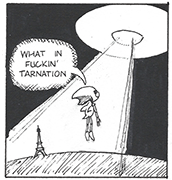|
Or internal dialogue, or foreign words/terms, etc. I can think of quite a few reasons you'd use italics. Bold and underline though, nope.
|
|
|
|
|

|
| # ? May 13, 2024 10:14 |
|
You can definitely use italics for both internal monologue and foreign terms, but my personal preference is not to. I think it’s dated. Dated can be good sometimes, I don’t have a problem reading Dune or w/e, but I wouldn’t use italics there in 2023.
|
|
|
|
Data Graham posted:Or internal dialogue, or foreign words/terms, etc. I can think of quite a few reasons you'd use italics. Bold and underline though, nope. Names of ships.
|
|
|
|
I'll (ab)use the gently caress out of an italic if it makes the words feel more gooder. gently caress bold and underline though, we're not friends.
|
|
|
|
Junpei posted:is it a bad thing to use italics, bolds and underlines? Because that's a thing I've noticed in a lot of published novels, they don't use it a lot unless they're, say, delineating an in-universe document from character's commenting on it, or the like. IMO the reason it's not used a lot is because you end up relying on the typography to delineate where the emphasis should fall instead of writing stronger prose where it's clear from the sentence construction, the character, and context of the scene where the emphasis should fall. In addition to the other uses mentioned, italics often gets used to indicate non-verbal communication (e.g. telepathy). I also use long stretches of italicized text that's indented in addition to a deliberate tense switch from past to present to indicate magical shenanigans (I treat these like excerpts from in-world texts) and I sometimes use small caps to indicate a particular magical action happening (in my non-typeset drafts this is usually indicated as text that is both italicized and bolded). Text messages, etc are also typically italicized and some text layouts use indentation and alignment to mimic how these are laid out. Beyond certain conventions like ship names, etc, italics, bold, and underline are used for effect. Just like anything else in writing, it's not necessarily good or bad in and of itself; it really depends on if your usage actually achieves the effect you want.
|
|
|
|
Wungus posted:I'll (ab)use the gently caress out of an italic if it makes the words feel more gooder. gently caress bold and underline though, we're not friends. Same. I've got a story where I translate a made up name and the translation of it's meaning is italics. It looks better that way to me, but if doing that is 'right', I have no idea.
|
|
|
|
Putting large sections in italics is annoying to read. Don't do that.
|
|
|
|
Gaius Marius posted:Putting large sections in italics is annoying to read. Don't do that.
|
|
|
|
Gaius Marius posted:Putting large sections in italics is annoying to read. Don't do that. I’ve had to put down two NYT bestsellers because the overuse of italics made them come off like fan fiction
|
|
|
|
change my name posted:I’ve had to put down two NYT bestsellers because the overuse of italics made them come off like fan fiction What were they trying to do using them? Was it all thought bubbles or trips to the past or what, cause they must be bestsellers for some reason. Probably got sweet artwork.
|
|
|
|
I have a lot of italicized radio/"telepathy" dialogue in my next book. Sorry. The publisher wanted consistent style on it to set it apart from regular internal monologue. I don't really like it but I didn't fight it super hard either.
|
|
|
|
 General Battuta posted:I have a lot of italicized radio/"telepathy" dialogue in my next book. Sorry. The publisher wanted consistent style on it to set it apart from regular internal monologue. I don't really like it but I didn't fight it super hard either.
|
|
|
|
Fat Jesus posted:What were they trying to do using them? Was it all thought bubbles or trips to the past or what, cause they must be bestsellers for some reason. Probably got sweet artwork. Tons and tons for emphasis throughout, both in dialogue and narration
|
|
|
|
I agree with the notion that bold and underline should never be used, and italics only sparingly. To that end, though, underlines should be utilized in drafts to denote lines that are meant to be italicized. Or at least that’s was Standard Manuscript Formatting suggested 15 or so years ago when I actually made writing a serious hobby. Not sure if that’s changed these days. Edit: actually, looks like that is an outdated practice and italics is generally acceptable in manuscripts now. The more you know! Cpt. Mahatma Gandhi fucked around with this message at 13:42 on Jul 30, 2023 |
|
|
|
Gaius Marius posted:Putting large sections in italics is annoying to read. Don't do that. Wungus posted:it's downright impossible for me, it makes reading feel like when my auditory processing breaks down and words just become sounds. Means I miss out on a lot of bullshit wank in a lot of books, but luckily, a lot of authors who do big sections in italics are using them for the most bullshit wank parts of the book Sorry guys, but I do not know how else to distinguish what's going on in a way that isn't even more off putting. If you have alternative suggestions for typesetting, I'm all ears and I guess I'll do that for special editions if I am ever confident that I'd break even on them. I suppose I could do a font change. I've seen font changes to sans serif fonts for things like emails. (I am not sure if Vellum would actually allow me to do a font change out of the box because the templates are so locked down.) But I haaaaaated when Call of the Bone Ships did that for excerpts from a log book though, because the font they picked was atrocious and made me think of that horrid cursive handwriting font that was the ONLY such font in existence back in the 90s.
|
|
|
|
I personally subscribe to the comic book style of just randomly bolding words without any particular rhyme or reason to it.
|
|
|
|
|
Cpt. Mahatma Gandhi posted:I agree with the notion that bold and underline should never be used, and italics only sparingly. To that end, though, underlines should be utilized in drafts to denote lines that are meant to be italicized. Or at least that’s was Standard Manuscript Formatting suggested 15 or so years ago when I actually made writing a serious hobby. Not sure if that’s changed these days. I did it until very recently when someone kindly informed me I was making everyone's life harder.
|
|
|
|
That was standard practice back when all authors had was typewriters. You could backspace and lay down some underlines on top of text you wanted to be typeset as italic, but your Smith-Corona couldn't swap in a new font.
|
|
|
|
|
I stopped using italics because copy/pasting from Scrivener to Google docs wipes out all my formatting, so I just learned to do without. I think it’s made my writing stronger tbh
|
|
|
|
Leng posted:Sorry guys, but I do not know how else to distinguish what's going on in a way that isn't even more off putting. If you have alternative suggestions for typesetting, I'm all ears and I guess I'll do that for special editions if I am ever confident that I'd break even on them. I'm fine with italics for specific kinds of dialogue (and have done just that before for psychic communication) but it's genuinely like, if there's more than a short paragraph, it's not going in my head. I'm reading The Adventures of Amina El-Sarafi right now and absolutely loving it, but there's big chunks of italics from time to time in epigraphs and poo poo that I can't read. It sucks, but whatever--I'm enjoying the hell out of the rest of the book.
|
|
|
|
General Battuta posted:I did it until very recently when someone kindly informed me I was making everyone's life harder. Can confirm, my gf works on the production side and stuff like this drives her nuts
|
|
|
|
Wow I left this reply tab open way too long. Re: use of italics: I use them sparingly, and mostly in dialogue. Outside of dialogue, there are a few words that I've italicized for emphasis or to express a particular vibe in the context of a character thinking about something. I write limited close third and do not use italicized inner thoughts (because I personally don't think via internal monologue and I've never liked italicized thoughts anyhow) so character thoughts bleed in with the exposition so there's a bit less formality than I'd be going for if I was writing omniscient third. DropTheAnvil posted:I think Brandon Sanderson did a good comparison on explaining magic vs not. Essentially Lord of the Rings doesn't explain magic, cause its.. magic. While with Sanderson, he wanted the reader to be able to piece together how the protagnist was going to "win" in fights, so the explains the magic system in depth. Except it feels like he fails to consider the possibility that a magic system could still be governed by well-designed, internally consistent rules even if those rules are never explicitly exposed to the character(s) or reader. Also it seems to me that he fails to consider or ignores the idea that magic can be used for narrative/thematic reasons other than either a tool that characters can use to resolve conflicts and advance the plot in the case of hard magic systems or "for visuals and for ambiance" in the case of soft magic systems. As a soft magic writer who's currently breaking all of Sanderson's "laws" to bring forth a magic that I use to explore themes of power, control, and mysticism, I feel kinda patronized whenever I read them. That said, there some solid nuggets buried in them, namely the bits about internal consistency and considering cost and limitations. Having a well-designed. internally consistent system is good practice, regardless of whether your magic is hard or soft. It's simple good planning so that you don't have to resort to rear end-pulls and the like down the road. Whether the rules of the system are exposed to the end user isn't nearly as important as Sanderson makes it out to be, in my opinion. I almost always find explicit depiction of hard systems to be too much cognitive load and much prefer learning the capabilities and limitations of a system by inference and trial and error, more like how you would interact with a hard magic system in a video game, where as the player, it's not your responsibility to remember how all this poo poo works because you can go try things and they'll work or they'll not because the game, its UI, and the environment is enforcing the rules of the system for you (Tears of the Kingdom is loving great for this). General Battuta posted:I wish Sanderson had never opened his mouth about magic, it has wasted so much time in so many minds. He’s just saying “I want to write fair play mysteries but magic” which is a much better thing to say than “I don’t understand Tolkien and I’m going to make it everyone’s problem.”  It would have been so much better if he'd presented them as "Brandon Sanderson's Guide to Sandersonian Magic Systems" or whatever instead of trying to map all the magics in the fantasy genre to his insufficient spectrum.
|
|
|
|
Did Sando ever actually say that "hard magic" systems are better, or just what he likes? The original "Law" he proposed was not "hard magic better" but: quote:Sanderson’s First Law of Magics: An author’s ability to solve conflict with magic is DIRECTLY PROPORTIONAL to how well the reader understands said magic. Which seems like a pretty good law to me, especially if you allow for the possibility that readers might "understand" the magic on an emotional level, or a level of general principles (e.g. "nothing is achieved without sacrifice"). I don't think Lord of the Rings really breaks this 'Law'--the magic is explained well enough for it to resolve the conflicts it does resolve (and notably, most of the climactic moments are not resolved by magic, but by courage, faith, physical endurance...)
|
|
|
|
On italics chat, while I think it's probably a good principle to try to avoid using italics or find some other, less distracting way to express things like inner thoughts or foreign words, the one place where I think they're pretty indispensable is when you're trying to capture emphasis in dialogue that you simply can't render any differently without changing the whole sense of what the character is saying. The example I have in my head is when Frodo says "I hope the thinning process will not go on indefinitely, or I shall become a wraith.” Which is the subject of a whole digression in Olsen's podcast when he gets to it, where he suddenly realizes that this sentence probably should have had shall italicized — so that it turns from a rather bizarre non-sequitur into a play on the then-pervasive threat of "fading" into the wraith world under the influence of the Ring. This may or may not have been the actual authorial intent (it sure would make sense at least); but assuming it was, how better to express that emphasized shall? All-caps? Or do you try to rework the line of dialogue so he's saying something less ambiguous? I'd shy away from the latter the most because when you're doing dialogue your primary purpose is (typically) to capture the character's voice and phrasing the way they should sound, using the words and inflection they would naturally use rather than what's convenient for you, and if you enslave the character to grammar rules or typographical limitations you risk neutering them. Italics let you spell out how a sentence of dialogue should flow and beat. Which is something I've wondered about my whole life: how in the hell do screenplays work? Where all the text is in all-caps Courier, and yet everything—everything—hinges on the actors being able to interpret the line on the page with the correct reading and rhythm? How is an actor supposed to go "oh, he means I shall become a wraith!" without the director knowing the material all inside and out and explaining it to them in the moment? I've seen plenty of TV shows or movies where an actor's reading seems bizarre and alien and it would have been saved by them emphasizing the right word, but the script must have given no indication of how it should work and the actor has no idea what's going on in the story or that they're playing off someone else's line who is in a different voice acting booth or something. https://montycasinos.com/montypython/scripts/greatactors.php.html posted:Sir Edwin: Ah, well, I don't want you to get the impression it's just a question of the number of words... um... I mean, getting them in the right order is just as important. Old Peter Hall used to say to me, 'They're all there Eddie, now we've got to get them in the right order.' And, er, for example, you can also say one word louder than another--er, 'To *be* or not to be,' or 'To be *or* not to *be*,' or 'To be or not to *be*' you see? And so on. Data Graham fucked around with this message at 11:15 on Jul 31, 2023 |
|
|
|
|
Wungus posted:Write things that don't need a type change to delineate what's happening? Or indent regular text, I guess? Or just don't bother trying to appease folks like me? I mean, I'm not losing sleep over it; more people have complained about being blue balled by the subplot than the italics  but I think barring doing something like I see in my daughter's unicorn fairies chapter books where the spells are legit typeset in a curly calligraphic font with fancy illustrated borders, the italics are not the worst thing in the world. but I think barring doing something like I see in my daughter's unicorn fairies chapter books where the spells are legit typeset in a curly calligraphic font with fancy illustrated borders, the italics are not the worst thing in the world.Sailor Viy posted:Did Sando ever actually say that "hard magic" systems are better, or just what he likes? He's super clear that he doesn't think one is superior to the other and it's how he conceptualizes what he likes to write and he named them laws because he thought it would be cool because Asimov. Pretty sure we had the same/similar discussion some 20 pages back and Muffin had a great post that summed up the problem as Sanderson being god tier at what he does and then some of his hardcore fans getting mad that other authors who write different stuff don't write exactly the way Sanderson would. Data Graham posted:On italics chat, while I think it's probably a good principle to try to avoid using italics or find some other, less distracting way to express things like inner thoughts or foreign words, the one place where I think they're pretty indispensable is when you're trying to capture emphasis in dialogue that you simply can't render any differently without changing the whole sense of what the character is saying. I saw someone post an example last week where the placement of the emphasis changes the meaning of the sentence depending on which word is emphasized. It was something like: "I never said we should kill him." Reads different when it's: "I never said we should kill him." "I never said we should kill him." "I never said we should kill him." "I never said we should kill him." "I never said we should kill him." "I never said we should kill him." "I never said we should kill him." Data Graham posted:Italics let you spell out how a sentence of dialogue should flow and beat. Which is something I've wondered about my whole life: how in the hell do screenplays work? Where all the text is in all-caps Courier, and yet everything—everything—hinges on the actors being able to interpret the line on the page with the correct reading and rhythm? How is an actor supposed to go "oh, he means I shall become a wraith!" without the director knowing the material all inside and out and explaining it to them in the moment? I've seen plenty of TV shows or movies where an actor's reading seems bizarre and alien and it would have been saved by them emphasizing the right word, but the script must have given no indication of how it should work and the actor has no idea what's going on in the story or that they're playing off someone else's line who is in a different voice acting booth or something. Having written stage plays before, basically actors are trained to figure it out. Also I got told not to bother writing extensive stage directions because the first thing the director and the actors will do is get a permanent marker and black out all the stage directions you wrote so they can focus on their lines. So you have to write really strong dialogue. Also do not underestimate the amount of training and talent actors have. At one workshop, just for a first reading, we were all sitting there with librettos in front of us and the actors were sitting on stools by the piano and the only thing in the libretto was "CHARACTER ENTERS." The actor stood. That was all. The entire workshop burst out laughing for a solid five minutes. And that was just the beginning of the scene.
|
|
|
|
Sailor Viy posted:Did Sando ever actually say that "hard magic" systems are better, or just what he likes? It’s very bad and I find it morally repugnant for reasons that are extremely It’s so narrowly tuned to post-D&D video game fantasy product, if you try to apply it to folklore or myth or even such edge cases as “the works of Ursula LeGuin” it starts telling you “no this story can’t be resolved this way, the reader doesn’t understand enough, error error.” If it was just an opinion or a statement of preference maybe don’t call it a law! And the worst part of all is it just creates these endless repeating conversations
|
|
|
|
Seth dick dick son, goon of something awful, wore cheeto dust on the day he was to make a post
|
|
|
Leng posted:Having written stage plays before, basically actors are trained to figure it out. Also I got told not to bother writing extensive stage directions because the first thing the director and the actors will do is get a permanent marker and black out all the stage directions you wrote so they can focus on their lines. So you have to write really strong dialogue. That's awesome (and hilarious), but it still really sounds like the least efficient possible way of conveying the writer's intention to the actors. There's got to be a less lossy way to encode the way the theoretical actors in the writer's head will deliver a line. Having to grind it down into all-caps screenplay heiroglyphics and making the actors and director have to apply their own idiosyncratic talents to decoding it seems like the worst kind of game of telephone. I guess that's why the writer is on-set a lot of the time, huh?
|
|
|
|
|
Data Graham posted:That's awesome (and hilarious), but it still really sounds like the least efficient possible way of conveying the writer's intention to the actors. There's got to be a less lossy way to encode the way the theoretical actors in the writer's head will deliver a line. Having to grind it down into all-caps screenplay heiroglyphics and making the actors and director have to apply their own idiosyncratic talents to decoding it seems like the worst kind of game of telephone. Think of it like a DND module writer explaining what the players will do at every point, instead of just saying what's in the room
|
|
|
|
Data Graham posted:That's awesome (and hilarious), but it still really sounds like the least efficient possible way of conveying the writer's intention to the actors. There's got to be a less lossy way to encode the way the theoretical actors in the writer's head will deliver a line. Having to grind it down into all-caps screenplay heiroglyphics and making the actors and director have to apply their own idiosyncratic talents to decoding it seems like the worst kind of game of telephone. It stops being the writer’s vision as soon as the director gets a hold of the script is why. It’s also why stage directions get blacked out. It’s a group effort to create the scene in which the actors get a say and the director can veto all decisions. The writers are on set to make revisions, but not their revisions—the director tells them what changes to make based on what’s not working on set. As for italics in dialogue, ambiguities can be resolved through other means, such as action beats or internal voice (in 1st person for example). On top of that, ambiguities are not necessarily wrong or bad. Leaving things up to interpretation just means there’s multiple ways to read a text—and readers get different things out of a text in any case. Your Tolkien example—I have never read that line with that emphasis, and yet I never had a problem getting what he means. There’s no reason to insist “shall” should have been italicized, when Frodo could have equally said that bit of irony with a dry flat voice indicating a feeling of already being defeated—or whatever! There is no way to force your specific vision on your audience, and trying to is a mug’s game. It’s like young writers who insist they have to describe every detail of their characters because they want everyone to know exactly what they look like—when it doesn’t matter. It really doesn’t. Give up all delusions of complete control—it’s not how stories work. Stories shift and mutate as they’re transmitted from one human mind to another. It’s a collaborative act even between one writer and one reader. The current resistance to using italics at all is out of a desire to trust the reader and allow them freedom of interpretation. It’s why the impulse to eradicate italics came out of the lit scene, from people who’ve studied Barthes and realize that “death of the author” and ambiguity is a good thing that enriches the text. From people who feel that trying to hold the reader’s hand the whole way is insulting their intelligence. Who realize that writing a novel is like handing the reader a script which the actors in their head will reinterpret based on their own experience and placing more strictures on those actors than necessary is unwelcome interference in a process they have no real control over. The control you have over your own text is an illusion, so let go that illusion and embrace ambiguity for the effects it can achieve
|
|
|
|
That was a drat good post
|
|
|
|
Or was it?? You decide (I liked it though)
|
|
|
|
Stuporstar posted:It stops being the writer’s vision as soon as the director gets a hold of the script is why. It’s also why stage directions get blacked out. It’s a group effort to create the scene in which the actors get a say and the director can veto all decisions. The writers are on set to make revisions, but not their revisions—the director tells them what changes to make based on what’s not working on set. Those are all excellent points. I should cut down on my italics for emphasis.
|
|
|
|
Sorry to double post, but a friend showed me this page of sample rejection letters for various markets, and I think it's interesting. Note, I cannot vouch for the veracity of the information, but it aligns with the rejection letters I've received. https://www.rejectionwiki.com/index.php?title=Literary_Journals_and_Rejections Linked therein is C.C Findlay's blog. I recently got a rejection from F&SF that was different that previous ones. I checked, and it's the one just below them buying it outright. So, that's good. It also jibes with other markets to which I've submitted, so I wonder if this is a common thing. http://www.ccfinlay.com/blog/nectar-for-rejectomancers.html Short version: Publish or Perish
|
|
|
sebmojo posted:Think of it like a DND module writer explaining what the players will do at every point, instead of just saying what's in the room This is why I often find RPG module writing advice more useful than traditional plot structures. I am very much a "gardener" style writer, and not knowing what my characters are going to do is just as much of an issue when writing as when GMing, so I find advice like "prep situations, not plots" to be highly useful. Instead of detailed plot outlines, I plan "modules" for my characters, and I don't have to throw all the preparation away when I get new ideas during the writing process.
|
|
|
|
|
It was a good post, but I’m still going to use italics. I guess I’m happy to keep using a device that clarifies meaning? In the same way I’d use one word over another if it was more appropriate. I can hear emphasis when people are speaking, and I have a convention to convey that readers in writing, so it seems limiting to not use it.
|
|
|
|
newts posted:It was a good post, but I’m still going to use italics. There’s nothing wrong with using them either. It’s a stylistic choice that has its reasons for/against just like ditching quotation marks can be a purposeful choice to achieve a specific effect
|
|
|
Data Graham posted:Or internal dialogue, or foreign words/terms, etc. I can think of quite a few reasons you'd use italics. Bold and underline though, nope. I try to avoid foreign words as italicised words because of an article I read that made the good point that by italicising them you're othering the language as something alien or unusual. I've been advised multiple times to italicise them because, basically, 'how will the reader know they're foreign words?'
|
|
|
|
Stuporstar posted:It stops being the writer’s vision as soon as the director gets a hold of the script is why. It’s also why stage directions get blacked out. It’s a group effort to create the scene in which the actors get a say and the director can veto all decisions. The writers are on set to make revisions, but not their revisions—the director tells them what changes to make based on what’s not working on set. Thanks, this is good -- and it feeds into the continuum of exercises I'm apparently doing in order to really understand and internalize the idea of appreciating a work on its own merits, separated from the author's intent, and the nature of adaptation and fanwork, and really about the whole concept of using language to imperfectly express a platonic "ideal" of concepts and thoughts, like whether there is such a thing as "correct English" or if it's important for people to understand the meanings of the colloquial expressions they're using, or if it's okay if they just repeat meaningless syllables as long as people get what they intend. It's part of why I keep listening to those Olsen podcasts, since they lean very hard toward that idea of evaluating an adaptation in and of itself and not in comparison to its source material, which of course is what you find is what Tolkien was so bothered about in On Fairy-Stories in the first place, where he talks a whole bunch about the various struggles you have trying to envision a textual story versus what you get when a story is rendered by dramatic actors, like where in text you're free to imagine "a piece of bread" in any of a million different ways, as many as there are readers, but as soon as you try to stage it as a play or a movie you have to make a choice about what kind of bread, what shape, on what sort of dish, and for 999,999 viewers those choices will be "wrong". It's a difficult and lifelong struggle, coming as many nerds I'm sure do from a place where having things "correct" was the foundation of my self-image during school, and learning to accept "wrong" things as just another interpretation, equally valid, is an uphill battle. As Olsen himself says, he had to undergo that same painful transition, from scandalized "true fan" to actual academic analyst, and I feel like I'm having to train myself out of the temptation to understand the context of a thing in order to understand the thing itself, which seems super counterintuitive and counterproductive, but that's just part of the process. It's like I'm doing that galaxy-brain-meme "causes of the Civil War" thing: "Slavery" => "Just do a book report on the story itself, because we don't know anything else about its circumstances" "States' rights, economic issues, matters of representation in new territories etc" => "Study the story's possible allegories, speculate on the author's state of mind and influences, study the effects of culture and politics on the work and of the work on culture and politics, etc" "SLAVERY" => "Just study the story itself, because the circumstances are irrelevant and really only detract from our understanding of how the mechanics of the story itself work" Which isn't to say that all those ancillary studies are all useless, just that they are of a different discipline and trying to achieve different things. It may or may not be academically useful to study what a story might be allegorizing, or to try to examine the author directly rather than the work, biographically, through their revealed thoughts as expressed in their fiction. But in studying the fiction itself, you have to put up that death-of-the-author guardrail which seems so very hot to the touch, and exercises like this one just keep reminding me that I'm not very good at it. All this from "hey should we use italics?" lol
|
|
|
|
|

|
| # ? May 13, 2024 10:14 |
|
newts posted:It was a good post, but I’m still going to use italics. Having just gotten out of a two week workshop, I have seen the light that is 'only include what is necessary'. I used to think that meant 'make your prose as cut down and boring as possible', but that's not the definition of "necessary" in this context. I used to write (well I still do, I just edit it) things like "Jack turned his head and looked at Eileen." Does it really matter that Jack turned his head, or will it be assumed by the reader? Nine times out of ten, it doesn't matter, unless Jack's head is strapped down in one position or something. Does Jack need to look at Eileen for some reason? If we're in Jack's close POV, even that's probably not needed. "Eileen wore that ugly green sundress again." is far better than "Jack turned to look at Eileen. She wore that green sundress he hated so much." Again, that's serviceable, but writing that way pulls the reader out of Jack's close POV, ands you can say the exact same thing in fewer words. It depends on what you want to accomplish, but it's good to be conscious of these things and make the choice. As a reader, I think tight prose is what separates a great writer from a good writer, so I am working on that. Back to italics. Does it really matter which word a character emphasizes? I bet 90% of the time, it does not. "When the stranger walked by the window, Carol said. "Who is that?" definitely gives the reader more information and conveys her emotional state, but let's say your character is on a busy street and says the same thing. Does it matter then? Are italics going to make a reader stop and say, "Why did she say it that way?" Then going back to the first example, if the situation is clear to the reader that Carol would be concerned about the stranger, does using italics add anything? If there's a murderer on the loose and a stranger walks by a window, the reader is going to know Carol should be concerned. So then what do the italics add that the reader wouldn't already pick up? There is no right or wrong way to use them, but some ways will be more effective than others is all I'm trying to say.
|
|
|

























